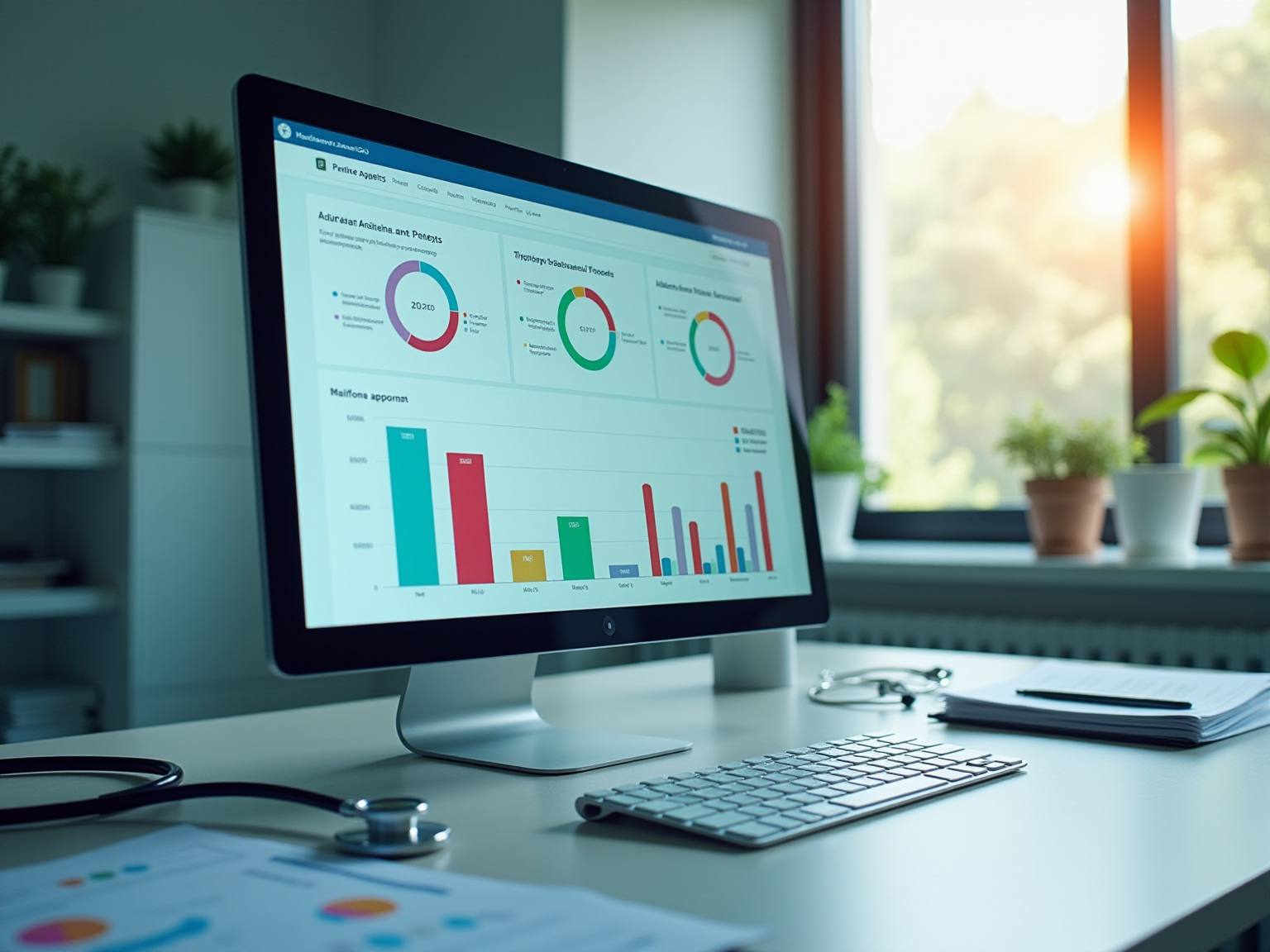Overview
Workflow automation in healthcare presents key benefits that cannot be overlooked:
- Enhanced operational efficiency
- Improved patient care
- Reduced administrative burdens
How can these advantages transform your organization? By streamlining processes such as appointment scheduling and billing, automation minimizes human error in medication administration and fosters data-driven decision-making. As a result, healthcare providers can achieve better health outcomes and increased organizational effectiveness. Embracing automation is not just a trend; it is a crucial step towards optimizing your healthcare operations.
Introduction
In the rapidly evolving landscape of healthcare, workflow automation stands out as a pivotal game-changer, fundamentally transforming how organizations operate and deliver patient care. By leveraging cutting-edge technology to streamline repetitive tasks, healthcare providers can significantly boost operational efficiency and mitigate the risk of human error. This transformation spans a broad spectrum of functions, from patient scheduling and billing to compliance management, ultimately fostering improved patient outcomes.
As healthcare managers increasingly recognize the vital role of timely information in patient care, the adoption of automated workflows is witnessing remarkable growth. With insights from industry experts and compelling case studies, this article delves into the multifaceted benefits of workflow automation, emphasizing its potential not only to alleviate administrative burdens but also to cultivate a culture of innovation and adaptability within the healthcare sector.
Understanding Workflow Automation in Healthcare
Workflow automation in healthcare employs cutting-edge technology to streamline and mechanize repetitive tasks and processes, significantly boosting operational efficiency. This encompasses a wide range of activities, including:
- Scheduling appointments
- Billing
- Managing medical records
- Ensuring regulatory compliance
By adopting workflow automation, medical organizations can enhance efficiency and reduce errors, ultimately leading to improved patient care.
Recent advancements in workflow technology have seen a notable increase in adoption, with over 80% of managers accelerating their initiatives to implement these innovations. This shift is fueled by the understanding that timely information is paramount for patient outcomes. These tools facilitate seamless data integration across various departments, ensuring that medical professionals have access to the information they need precisely when they need it.
Statistics reveal that 45% of business teams play a vital role in developing automated processes, underscoring the collaborative effort required to implement these systems effectively. Furthermore, a significant 74% of employees express a willingness to acquire new skills or retrain to remain competitive, reflecting a proactive approach to upskilling that aligns with the evolving demands of the healthcare sector. This adaptability is essential as mechanization continues to reshape the industry.
Successful implementations of workflow automation in healthcare within hospitals have demonstrated tangible benefits. For instance, the extensive use of marketing technology has streamlined tasks such as social media posting and email marketing, resulting in increased productivity and reduced costs. This trend is mirrored in the medical field, where workflow automation is optimizing operations and enhancing patient care efficiency, highlighting the potential for cost savings and improved service delivery.
Expert insights underscore the transformative impact of workflow automation on medical service delivery. As Gustavo Estrada notes, organizations that embrace mechanization, such as Avato, can simplify complex projects and achieve outcomes within desired timelines and budgetary constraints. Avato’s hybrid integration platform is particularly adept at addressing the challenges of workflow automation in healthcare, providing a robust foundation that enhances operational functions and ensures seamless integration of diverse systems.
This platform adds value to legacy systems while securely managing complex integrations, which is crucial for sectors like banking and medical services that require 24/7 uptime and reliability. Moreover, Avato’s commitment to tackling intricate issues enables organizations to navigate the complexities of integration with confidence, ultimately leading to substantial cost savings and enhanced operational effectiveness.
In conclusion, the integration of workflow automation in healthcare not only enhances operational capabilities but also equips organizations to respond to evolving needs. As the sector continues to advance, the focus on mechanization, supported by Avato’s dedicated hybrid integration platform, will be critical in improving care for individuals and overall medical efficiency.
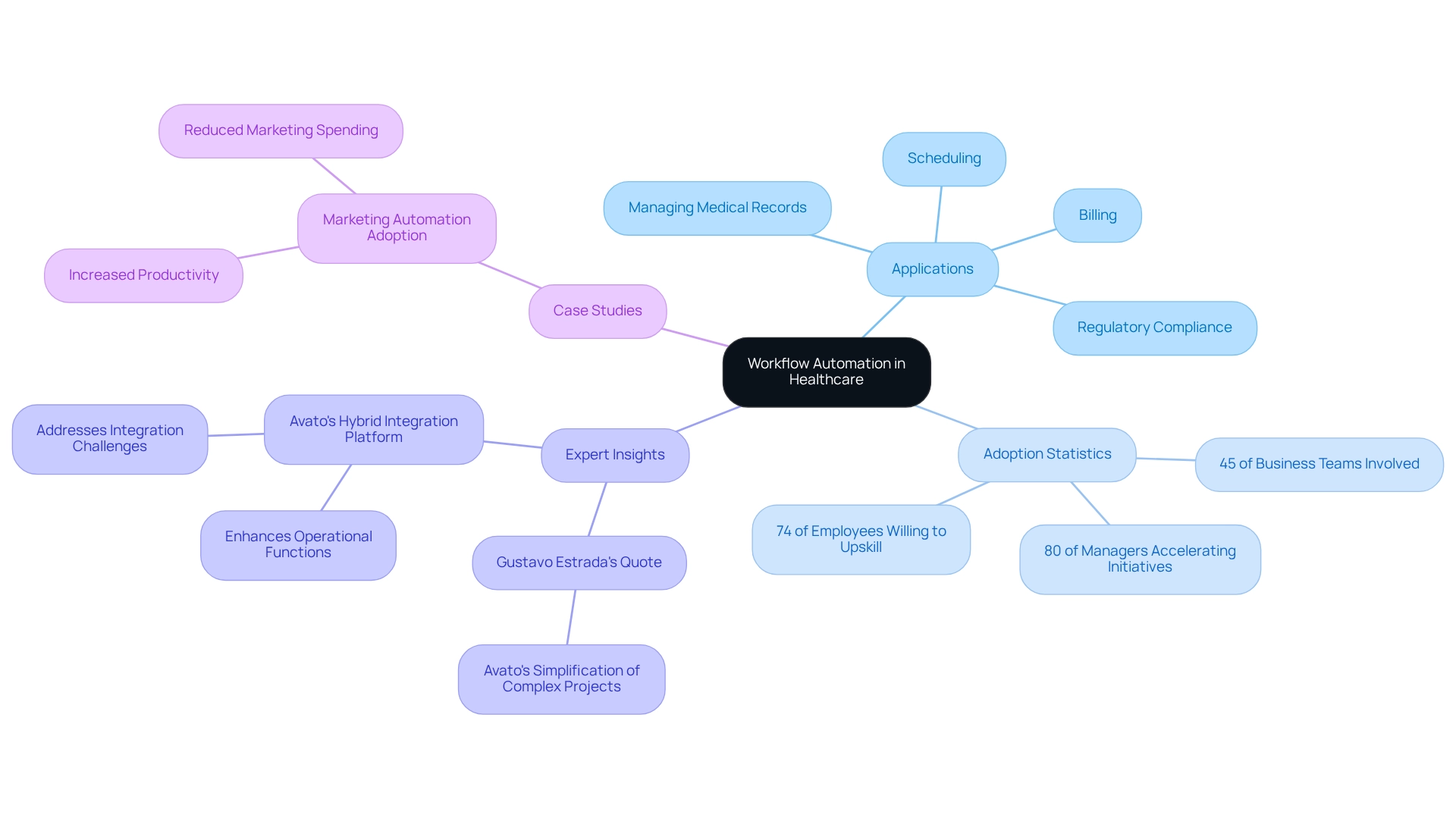
Streamlining Processes for Enhanced Efficiency
The implementation of workflow automation in healthcare significantly enhances various medical processes by minimizing the time dedicated to manual tasks. For instance, automated appointment scheduling systems not only reduce the incidence of no-shows but also optimize staff allocation, leading to a more efficient use of resources. A notable case study titled ‘Streamlining Payment Processes’ illustrates how online appointment scheduling systems incorporate secure payment options, improving financial tracking and eliminating the need for in-person transactions.
This advancement not only improves convenience for individuals but also guarantees adherence to financial regulations, simplifying the auditing process. Moreover, electronic health records (EHR) systems play a crucial role in streamlining operations by automatically updating individual information. This capability ensures that medical providers have immediate access to the most current data, which is vital for informed decision-making. Consequently, medical professionals can allocate more time to client treatment instead of administrative responsibilities, ultimately enhancing the quality of service provided.
Data shows that automated appointment scheduling can save medical providers considerable time, enabling them to concentrate on essential tasks. In 2025, the integration of EHR systems is anticipated to further improve provider efficiency, as these systems enable seamless information sharing and decrease redundancies in data management. Expert insights from healthcare IT leaders, including contributions from Ms. Claire Twose of Johns Hopkins University, emphasize that workflow automation in healthcare not only streamlines processes but also fosters a culture of innovation within healthcare organizations.
The advancements in digital medicine, particularly through AI and VR technologies, are also transforming interactions with individuals by humanizing experiences and enhancing treatment options. For example, virtual reality applications have demonstrated potential in pain management and PTSD therapy, enabling individuals to engage with their care in creative ways. Specific examples from the Interface Summit, such as the use of VR for pain management and the AI avatar for user interaction, illustrate how these technologies can enhance experiences.
Moreover, the integration of Avato’s hybrid platform with Red Hat’s open-source solutions supports these advancements by ensuring that medical organizations can effectively manage and share data, ultimately leading to enhanced outcomes for individuals. However, it is crucial to recognize the documented challenges to technology implementation in the medical field, such as cultural receptivity, trust issues, resistance to change, and costs associated with solutions. Furthermore, restricted insights into the traits of individuals engaged in the self-scheduling process emphasize possible deficiencies in comprehending user requirements in automated systems.
By adopting mechanization and utilizing digital medical technologies, providers can achieve workflow automation in healthcare, leading to streamlined processes that improve overall operational efficiency and client satisfaction. Furthermore, the importance of patient data accessibility and ownership cannot be overlooked, as empowering patients with control over their health data is crucial for exploring new treatment options.
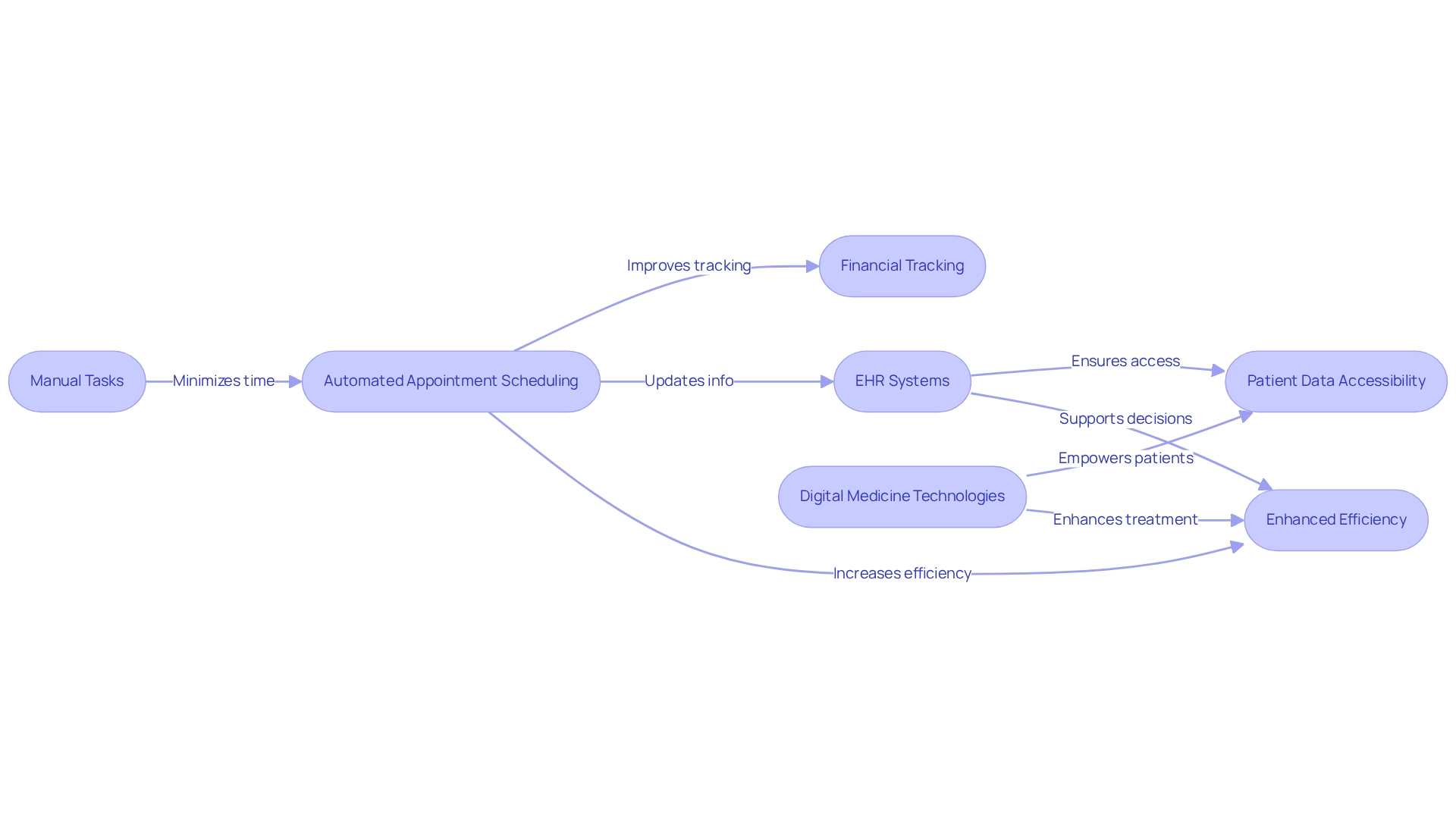
Minimizing Administrative Burden
Workflow automation in healthcare emerges as a pivotal solution to alleviate the administrative burdens that medical staff encounter daily. By automating routine tasks such as data entry, billing, and appointment reminders, healthcare organizations can significantly reduce the workload on their employees. This reduction in repetitive tasks not only enhances job satisfaction but also mitigates the risk of burnout, a prevalent issue within the medical field.
Consider automated systems that adeptly manage client follow-ups and reminders. This allows staff to concentrate on more complex interactions that demand human empathy and expertise. How much more effective could your team be if they could focus on what truly matters?
Statistics indicate that organizations embracing AI-driven workflows can more effectively manage client populations, prioritizing preventive measures that lead to improved health outcomes and reduced costs. A study by the Office of the National Coordinator for Health Information Technology (ONC) underscored six essential priorities for refining workflow processes in healthcare, highlighting the need for high-quality data and stakeholder engagement to bolster efficiency and patient care. This aligns with Avato’s commitment to providing a specialized hybrid integration platform that enhances workflow automation in healthcare, streamlining diverse systems and increasing business value, ensuring medical organizations can adapt to evolving needs and maintain a competitive edge.
Avato’s hybrid integration platform serves as a crucial solution in this context, enabling seamless data connectivity and integration across various medical systems. Expert insights underscore the importance of workflow automation in healthcare to alleviate administrative burdens. Aashima Gupta points out that technologies like Vertex AI Search for Medical Services are designed specifically for workflow automation, reducing administrative tasks for medical personnel and enhancing their capacity to deliver quality care.
Moreover, Avato guarantees 24/7 availability for essential integrations, emphasizing the critical nature of reliability in automated solutions. As mechanization continues to evolve, its impact on workflow automation in healthcare is expected to improve staff satisfaction and job efficiency, making it an indispensable component of modern medical management. By engaging stakeholders and effectively modeling business processes, Avato demonstrates its dedication to crafting the technological frameworks necessary for transforming the healthcare landscape.
Enhancing Compliance and Regulatory Adherence
Healthcare organizations operate under stringent regulations that demand precise record-keeping and timely reporting. Workflow automation in healthcare plays a crucial role in enhancing compliance by ensuring that all necessary documentation is completed accurately and punctually. Automated systems are designed to monitor changes in regulations, allowing for real-time updates to processes and significantly reducing the risk of non-compliance.
For instance, automated compliance checks can proactively notify personnel about absent documentation or upcoming deadlines. This capability allows medical service providers to fulfill all regulatory requirements without the weight of manual supervision.
As we look ahead to 2025, the compliance landscape in the medical field is evolving. Notably, 58% of compliance teams recognize vendor responsiveness as their biggest challenge in managing third-party risk. This underscores the necessity for organizations to leverage technology, including AI and VR, to enhance compliance efficiency and effectiveness. The incorporation of digital medicine not only aids patient care but also improves data management, ensuring that medical providers have access to the historical health information necessary for informed decision-making.
Furthermore, 35% of business and tech executives view third-party breaches as one of the most concerning cyber threats, highlighting the critical nature of robust compliance measures. Additionally, 27% of security and IT experts identify reducing internal audit exhaustion from repetitive evaluations as the primary challenge in compliance programs. This illustrates the persistent issues organizations face in upholding compliance.
The impact of workflow automation in healthcare on regulatory adherence is significant. By utilizing workflow automation, medical organizations can enhance operational efficiency while ensuring compliance with continually evolving regulations. A notable case study is CashCo Financial’s partnership with Feathery, which unified their loan application processes. This collaboration resulted in a 26% increase in approved loans and enhanced operational efficiency.
This demonstrates how mechanization can lead to substantial advancements in compliance and operational results.
Expert insights indicate that workflow automation in healthcare improves regulatory adherence by reducing human error and ensuring consistent application of compliance protocols. As the healthcare sector continues to embrace automation alongside advancements in digital medicine—such as using VR to treat PTSD and AI avatars for interactions—the significance of compliance in healthcare automation cannot be overstated. By implementing automated solutions, organizations can manage the intricacies of regulatory requirements more efficiently, ultimately resulting in enhanced individual support and improved organizational performance.
Furthermore, cultivating an open-data future where individuals have ownership and access to their health information is crucial for achieving the complete potential of these digital innovations.
Improving Patient Safety and Care Quality
Workflow automation in healthcare is vital for enhancing safety and quality of service within medical environments. By implementing workflow automation for critical processes such as medication administration and monitoring individuals, healthcare providers can significantly mitigate the risk of human error. For instance, automated alerts can swiftly notify staff of potential drug interactions or allergies, ensuring that individuals receive safe and effective treatment.
Research indicates that independent double checks involving two different nurses can detect up to 93% of errors, underscoring the necessity of systematic checks facilitated by automation. This raises an important question: how can we further enhance these checks to ensure optimal patient safety?
Moreover, the integration of digital medicine technologies, including AI and VR, plays a crucial role in elevating the treatment experience. These technologies not only expand treatment options but also enhance data accessibility, empowering medical providers to make informed decisions based on comprehensive individual histories. Adhering to federal standards is essential to guarantee the ethical use of AI in healthcare, which is critical for maintaining trust and safety in care.
Streamlined communication between departments fosters improved coordination, which is essential for achieving better outcomes and heightened satisfaction. How can we leverage technology to facilitate this communication?
A case study on the influence of technology on medication administration revealed that technology-related challenges, such as equipment usability and design, significantly contributed to deviations in medication administration. Addressing these issues through enhanced technology design can lead to improved compliance and user safety. The latest advancements in healthcare process optimization, including predictive analytics and real-time monitoring, further bolster the effectiveness of care management.
Workflow automation in healthcare, exemplified by automated alerts, has proven to reduce medication administration errors, thereby enhancing overall patient safety. As Gustavo Estrada noted, “Avato has simplified complex projects and delivered results within desired time frames and budget constraints,” emphasizing the significance of effective automation processes. Avato’s dedicated hybrid integration platform is essential for unlocking isolated assets and amplifying business value, ultimately paving the way for a more efficient and reliable medical system.
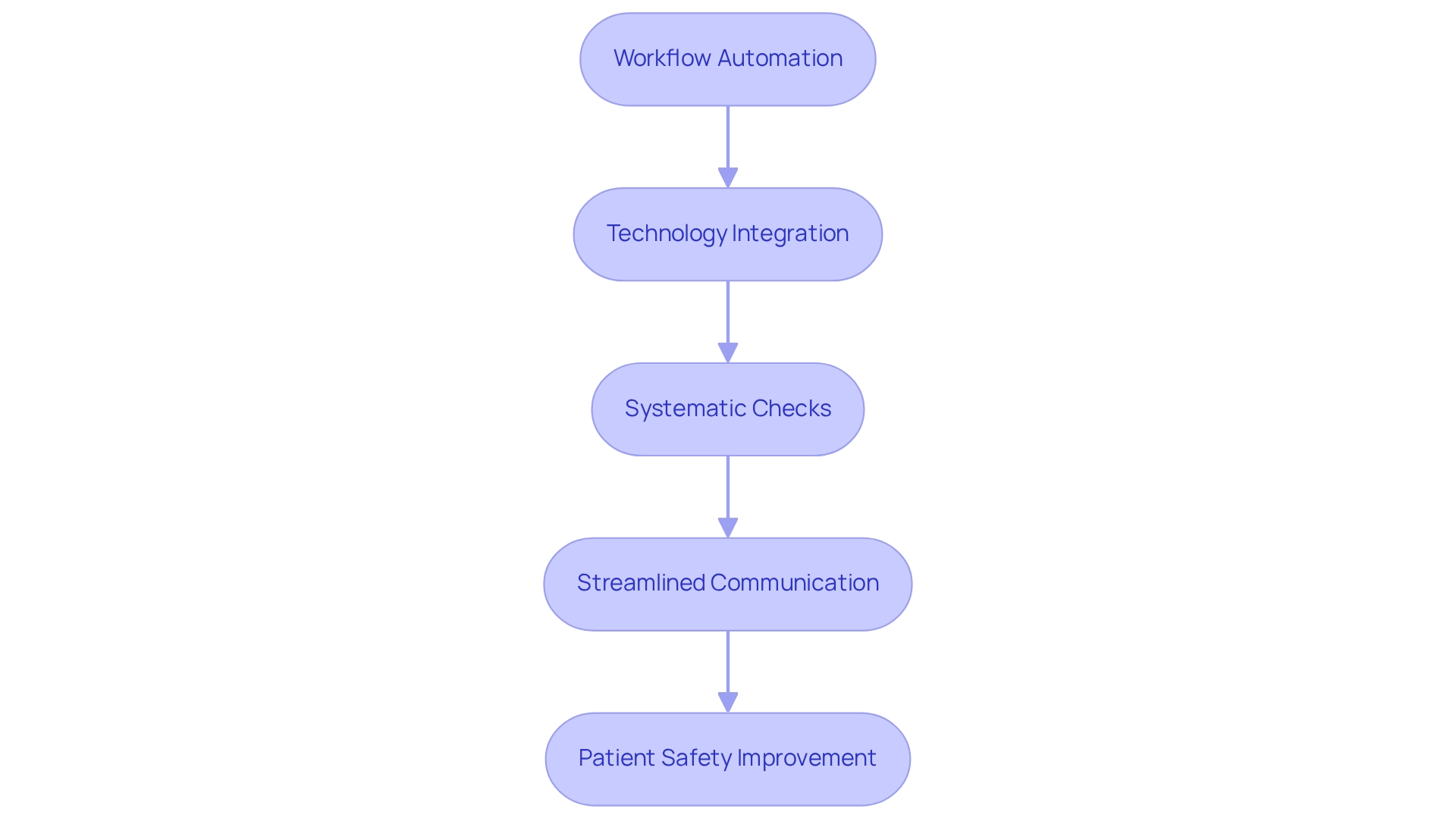
Leveraging Data for Informed Decision-Making
Workflow automation in healthcare empowers medical organizations to leverage data more effectively, facilitating informed decision-making. By integrating various data sources, Avato’s Hybrid Integration Platform streamlines complex integrations, enhancing workflow automation in healthcare and enabling automated systems to deliver real-time insights into operational efficiency and resource allocation. Additionally, this platform provides real-time monitoring and alerts on system performance, ensuring that medical providers can respond promptly to any issues.
Consider the impact of analytics tools that reveal patterns in outcomes for individuals, allowing medical providers to refine their strategies accordingly. This data-driven approach not only improves individual treatment but also incorporates workflow automation in healthcare to bolster strategic planning and resource management within medical organizations.
A notable case study involves the development of Health Records (HR) to integrate Clinical Decision Support Systems (CDSS). This integration fosters greater individual participation in health management, enhancing communication between individuals and providers. The encouraging results of this integration underscore the potential of technology in enhancing patient engagement and improving overall care.
As Gustavo Estrada, a client, noted, Avato simplifies complex projects and delivers outcomes within defined timeframes and budget constraints, showcasing the efficiency of mechanization in medical environments.
Current statistics reveal that over 200,000 industrial robots are installed worldwide each year, highlighting the growing trend of mechanization across various sectors, including healthcare. This trend is particularly relevant as automated tumor grading and pathology report analysis exemplify applications of CDSS in laboratory testing. As mechanization continues to advance, it is expected to play a crucial role in workflow automation in healthcare, although challenges related to regulatory compliance and integration must be addressed.
Avato’s platform can help alleviate these challenges by optimizing processes, ensuring compliance with evolving regulations, and significantly reducing costs.
Expert insights emphasize the importance of utilizing data for decision-making in enhancing medical systems. Analysts advocate for data-driven approaches in healthcare, noting the substantial impact of analytics tools on outcome trends, especially as we approach 2025. By adopting technology through Avato’s Hybrid Integration Platform, medical organizations can enhance their workflow automation in healthcare, ultimately leading to improved data analytics, better outcomes for individuals, and increased operational efficiencies.
The Future of Workflow Automation in Healthcare
The future of workflow automation in healthcare is on the brink of a significant transformation, driven by advancements in artificial intelligence (AI) and machine learning (ML). These technologies are not merely enhancing existing processes; they are paving the way for predictive analytics and personalized individual care. For example, AI-powered tools can sift through vast amounts of patient data to identify health trends, enabling medical providers to implement proactive interventions that significantly enhance patient outcomes.
By 2025, the integration of AI and ML in medical process enhancement is expected to reach unprecedented levels, with the market projected to expand to $8.42 billion by 2027. This growth reflects a broader trend in which healthcare organizations are leveraging workflow automation to address challenges such as staff shortages, professional burnout, an aging population, and the increasing volume of health data. The impact of these technologies is already evident, as illustrated by case studies in precision medicine, where AI enhances clinical decision support by providing real-time recommendations tailored to individual characteristics.
Research indicates that AI can accurately predict treatment responses, thereby improving the effectiveness and safety of personalized treatments. Furthermore, the role of digital medicine, particularly through the use of virtual reality (VR) and AI, is revolutionizing care by integrating human elements into treatment processes. For instance, VR has been shown to reduce pain perception in children during medical procedures, while AI-driven avatars, such as Nadia, offer tailored guidance to individuals, enhancing their understanding of treatment options. Another notable example is SimCoach, which employs a virtual avatar programmed with AI to support veterans coping with PTSD.
This humanization of medical services is crucial, as it fosters a more compassionate approach to individual interactions. Expert opinions underscore the importance of regulatory approval and integration with electronic health record (EHR) systems for the widespread adoption of AI in the medical field. As Thomas Davenport aptly states, “For widespread adoption to take place, AI systems must be approved by regulators, integrated with EHR systems, standardized to a sufficient degree that similar products work in a similar fashion, taught to clinicians, paid for by public or private payer organizations, and updated over time in the field.” Moreover, medical schools are increasingly urged to incorporate AI-related topics into their curricula, reflecting a growing recognition of AI’s potential to enhance clinical practices.
As healthcare continues to embrace digital transformation, organizations that prioritize workflow automation will be strategically positioned to improve care for individuals and enhance operational efficiency, ensuring they remain competitive in a rapidly evolving landscape. Additionally, the significance of data accessibility and ownership must not be overlooked; patients should have control over their health data to fully leverage these new treatment options. Avato is dedicated to facilitating this open-data future, empowering individuals to manage their own health information.
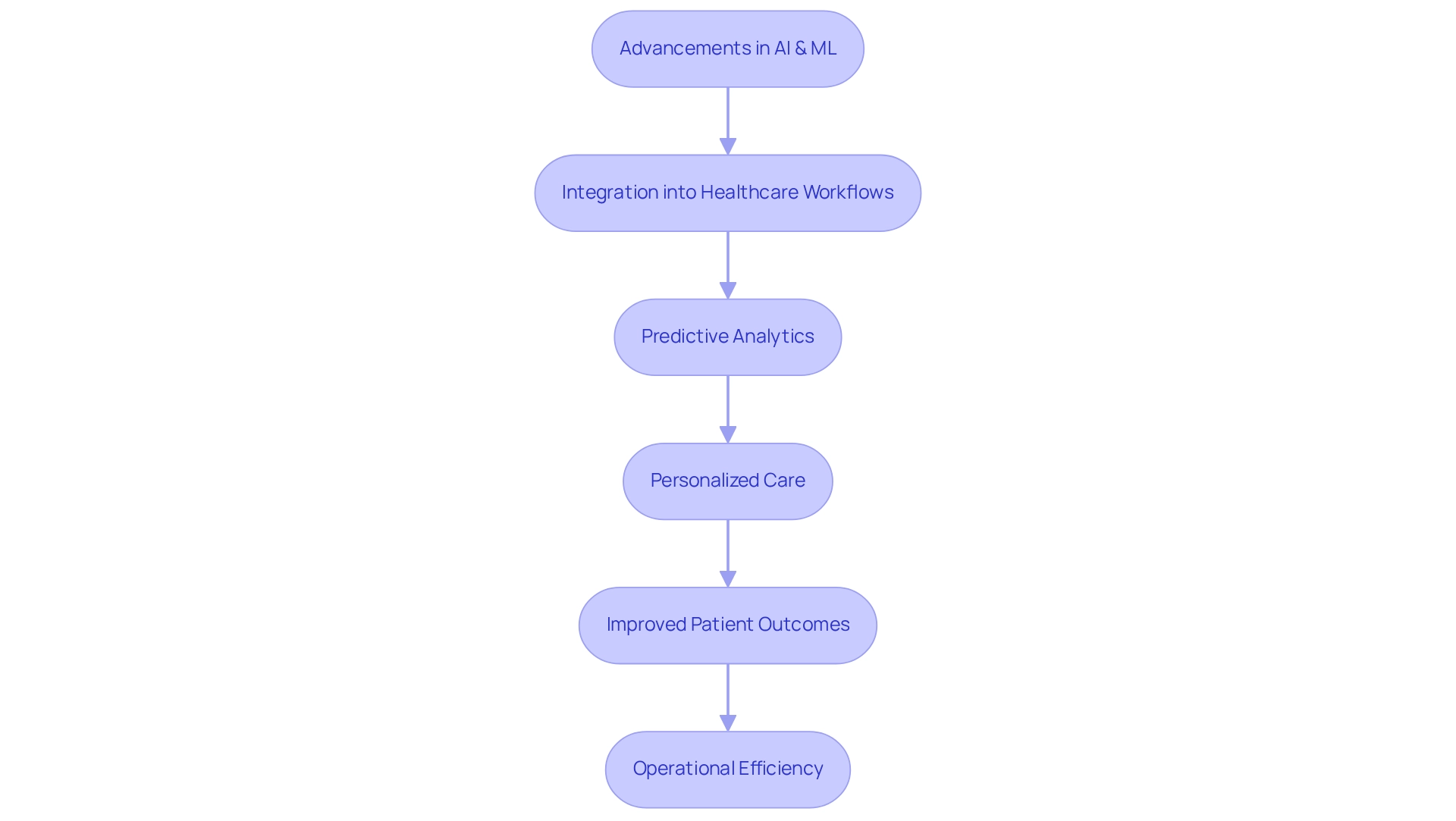
Conclusion
Embracing workflow automation in healthcare is not merely a trend; it represents a vital evolution that significantly enhances operational efficiency and the quality of patient care. The integration of advanced technologies empowers healthcare organizations to streamline repetitive tasks, minimize human error, and bolster compliance with regulatory standards. From automating appointment scheduling to improving data accessibility, automation acts as a catalyst for transforming healthcare delivery.
As healthcare managers increasingly acknowledge the critical nature of timely information, the adoption of automated workflows is poised to escalate, driven by the imperative for improved patient outcomes and organizational adaptability. Compelling case studies and expert insights illustrate how automation alleviates administrative burdens while fostering a culture of innovation within healthcare settings. Organizations utilizing robust platforms, such as Avato’s hybrid integration solutions, are better prepared to navigate the complexities of modern healthcare demands.
Looking to the future, workflow automation holds immense promise, especially with the potential for AI and machine learning to revolutionize patient care through predictive analytics and personalized treatment options. As healthcare systems continue to evolve, those prioritizing automation will not only enhance patient experiences but also improve operational efficiencies, securing a competitive edge in an increasingly digital landscape. Ultimately, the commitment to integrating automation is essential for unlocking the full potential of healthcare, paving the way for a more efficient, effective, and patient-centered industry.

